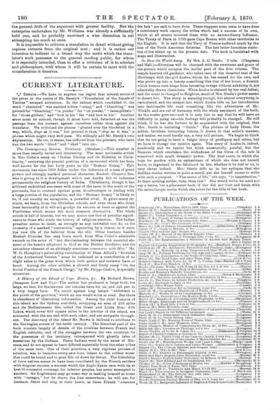The Contemporary Review, February. (Strahan.)—This number is more than usually
varied and interesting. The most noticeable article is Miss Collet's essay on "Indian Theism and its Relation to Chris- tianity," reviewing the present position of a movement which has been well known for the last forty years as the "Brehm° Somaj." This movement has since 1859 fallen under the influence of a man of great powers and strongly marked personal character, Keshub Chunder San, who is giving to it a development which can hardly fail to influence permanently the religious history of India, Christianity, though it has achieved undoubted successes with some of the races in the south of the peninsula, has to contend against great disadvantages in dealing with a large portion of the population, and the " Brahmo Somaj " is likely to be, if not exactly an antagonist, a powerful rival. It gains many re- cruits, we learn, from the Christian schools, and even those who think least favourably of it will not grudge its success, at least as against the Positivism which seems the most common alternative. The whole article is full of interest, but we may notice one fact of peculiar signifi- cance to those who study the history of religious emotion. The Indian preacher seems to insist, as strongly as any revivalist can do, on the necessity of a marked "conversion," separating by a chasm, as it were, the new life of the believer from the old. Other teachers besides Keshub Chunder Son may learn much from Miss Collet's admirable remark on the error of "not discriminating between the essential ele- ment of the heart's allegiance to God as the Perfect Goodness, and the secondary element of an abidingly conscious communion with Him." Mr. W. G. Humphry's painstaking examination of Dean Alford's "Revision of the Authorized Version" must be reckoned as a contribution of no slight value to the groat work which both author and reviewer have at heart. Among the other articles, a shrewd and lively essay "On the Social Position of the French Clergy," by Mr. Phipps Onslow, is specially attractive.


































 Previous page
Previous page